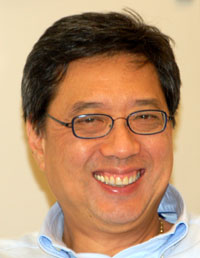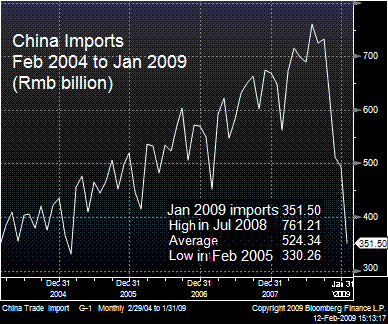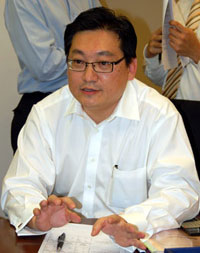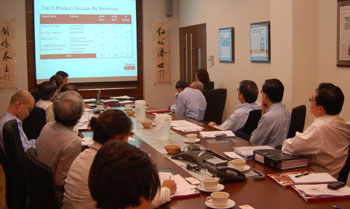
There's no telling when the recession will end, but Eu Yan Sang CEO Richard Eu is all smiles as TCM has proven itself recession-proof. Photo by Sim Kih
OPERATING CASHFLOW of Eu Yan Sang, Asia’s leading Traditional Chinese Medicine (TCM) retailer outside China, continued to improve during 2Q09 after cleaning up its balance sheet in FY08.
Operating cash flow improved 35% yoy to S$7.4 million for 2Q09, thanks to better inventory management and increased cash sales of hampers.
Inventories moved more rapidly during the last few weeks of Dec 2008 compared to a year ago as this year’s lunar new year fell 2 weeks earlier than previously.
Revenue edged up 6% to S$53.4 million, helped by resilient retail sales of flagship products like bottled bird’s nest, Bo Ying Compound and Bak Foong Pills.
Sales in retail TCM grew 11% yoy to reach S$42 million.
”Expect more products in the months ahead,” said CEO Richard Eu, who wants to maintain sales value per store through a constant pipeline of new products.
Six new retail stores were opened during 2Q09, half of which were in Malaysia.
Sales growth in Malaysia continued to outperform all the other markets, surging 28% to RM 26.3 million (S$10.9 million) before translation to the Singapore dollar reporting currency.
Singapore retail sales grew 8% to S$16.4 million while Hong Kong dipped 3% to HK$136 million (S$26 million).
Domestic retail sales in Hong Kong were in fact robust, according to the management, but this was dampened by wholesale exports out of Eu Yan Sang's Hong Kong factory.
Wholesale sales fell 19% to S$7.3 million, but are expected to improve in 4Q09.
Most wholesales sales come from China, which has given the green light for the company’s exports of its best-selling Bo Ying Compound and Bak Foong Pill.

Domestic retail sales in Hong Kong was strong, but was affected by exports to China.
Exports of these items to China had been halted since July last year pending a license renewal, which came through in Feb, two months ahead of the company’s 4th quarter period over Apr-Jun.
However, the extent of recovery remains to be seen, as China imports are now nearing a 5-year low.
Affected by the financial crisis, China-bound shipments have plunged from a historic high of Rmb 761 billion in July 2008 to Rmb 352 billion in Jan 2009.
Revenues from clinics grew 12% to reach S$3.6million. A new integrative medical center was also opened in Hong Kong, the Group’s first in the SAR.
The company's gross profit margins expanded one percentage point yoy to 52%, while net profit grew 11% to reach S$3.5 million.
Net gearing as at 31 Dec 08 remained low at 0.2.
The company held an analyst briefing on its 2Q09 results at its headquarters on South Bridge Rd last evening. Below is a summary of the questions raised and the management’s answers:

More cash now as Wisconsin ginseng was paid for upfront in previous quarter, says CFO Danny Heng. Photo by Sim Kih
Q: Please update us on the losses from discontinued operations (which grew 448% yoy to S$1.2 million for 2Q09).
A: The losses pertain to the disposal of Red White and Pure’s businesses. These are mainly renovation expenses. There will be no more losses from discontinued operations going forward.
Q: Why restate the previous financial year?
A: For a better yoy comparison, we reclassified expenses related to the ceased business in Red White and Pure and the liquidation of YourHealth Group.
Q: Why did Malaysia show such strong sales?
A: We have a strong marketing team there. We are analyzing our database of 260,000 retail customer-members to improve marketing efforts.
Q: How will the current drought in China affect your source of raw herbs?
A: Herb supplies come in during May to Nov. As it is not a growing season currently, we do not know yet what impact the drought will have.
Q: Do you have problems with debtors?
A: Most of our revenues are contributed by our retail business, which is a cash business. Bad debts do not pose a problem for our wholesale business even though it is on open account basis. Group debtor days have improved from 37 as at 30 Jun 2008 to 35 as at 31 Dec 2008.

Full house at Eu Yan Sang's 2Q09 briefing yesterday evening. Photo by Dave Tan
Q: Do you hedge?
A: No we don’t, with the exception of liabilities on inter-company transactions. Our herb costs are mainly in USD, to which Malaysia’s and Hong Kong’s currencies are pegged.
Q: How do your clinics and retail stores complement or cannibalize each other?
A: Our clinics are operated to be profitable on a stand-alone basis.
Q: Do you face a problem where patients take your prescription and buy raw herbs from cheaper TCM stores?
Chances are customers take a prescription elsewhere and come to us for raw herbs, which we provide in powder form and are more potent.
The reliability of our clinic dispensary is a second reason why customers prefer our herbs. There have been cases where some of these herbs have been mislabeled at other TCM shops. We have a system to ensure herbs are properly labeled.
Related story: EU YAN SANG: Operating cash flow swings to S$4.5m from red







